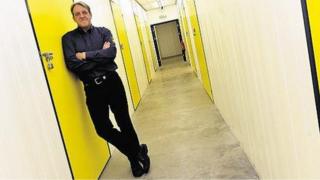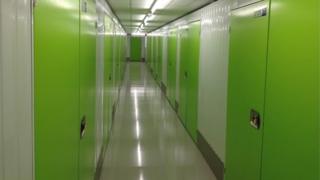‘Finding space to store my Dalek’ – BBC News

 Image copyright SSA
Image copyright SSA Last week a Scottish self-storage company announced plans to expand its operations in Glasgow. The concept of self-storage is relatively new to Scotland but it seems to be catching on. So what do people use storage centres for?
When a full-sized Dalek turned up at Jon Wilson’s workplace, he barely batted an eyelid.
As operations director of an Aberdeen-based self-storage company, he’s seen plenty of strange things over the past 10 years.
He says: “We’ve had some weird and wonderful items stored here. Last year we were sitting next to the office window when a 6ft tall Jabba the Hut went past.
“It turned out it was a prop for a Star Wars event.”
‘Hotel for goods’
Mr Wilson’s company, Simply Self Storage, is among dozens of firms with purpose-built secure storage facilities which have sprung up in Scotland since the early 1990s.
“Our storage facility has 700 rooms in 40 different sizes,” he says. “We like to think of it as a hotel for goods.
“People have a wide variety of reasons for using our business. It could be that they have builders in at their homes and need to make space, or they have space-hungry hobbies like collecting movie memorabilia.”

Simply Self Storage also has between 140 and 160 business customers from a range of industries, big and small.
“We have had a customer who imported flip-flops from Brazil and sold them across Europe,” he explains. “He used our facility to store his goods as he took orders.
“We also get a lot of start-ups who for financial reasons don’t want to put their money into a property of their own and want access to their equipment as and when they need it.”
Self-storage facts and figures
- The UK has an estimated 1,100 self-storage sites, of which 195 only offer container storage.
- Total UK industry turnover in 2015 was estimated at 440m, spread across nearly 500 operators.
- Safestore is the UK’s largest group with 134 stores, including seven in Scotland.
- 90% of the public have heard of self-storage but understanding of the product remains low at about 30%.
- 66% of people surveyed could not name a single self-storage brand.
Source: SSA 2016 UK Annual Survey
The Self Storage Association UK (SSA), a trade body with more than 30 members in Scotland covering 60 sites, says about 25% of customers are firms.
Chief executive Rennie Schafer explains: “They might be small businesses, e-businesses, even large businesses looking for flexible warehouse space.
“Personal customers use it for a whole lot of different reasons – usually life-changing moments.
“They might have had a baby, entered a relationship, left a relationship or maybe had a death in the family.
“Sometimes they are selling their homes and want to de-clutter it for sale, so they use self-storage as a way to store goods that they don’t need every day.”
 Image copyright Simply Self Storage
Image copyright Simply Self Storage The public’s appetite for renting extra space has been growing in Scotland in recent years.
This week, East Lothian-based Kangaroo Self Storage said it planned to create hundreds of extra units at its Glasgow site and invest in its Dundee facility following an increase in demand.
Kangaroo said it had benefited from a rise in the number of householders moving back home to live with their parents during the recession.
It also cited students increasingly using storage rooms over the summer holidays.
But growth in the Scottish market has been slower than some other parts of the UK.
The self-storage industry started up in the UK in the early 80s but didn’t catch on in Scotland for another 10 years, according to the SSA.
It says much of the growth has been in more populated areas north of the border, particularly the central belt.
 Image copyright SSA
Image copyright SSA Mr Schafer explains: “The Scottish market was not as developed as the south of England so growth was not as fast there.
“Scotland is more sparsely populated and more densely populated areas help to bring more visibility to the product.
“Self-storage companies are looking for prime locations – they are looking for highway frontage and sites that are highly exposed because the industry is still very young and a lot of people don’t understand it or don’t know about it.
“In Scotland we don’t have much dominance by the major chains at all – in fact the three major operators in the UK only have a handful of sites there so the Scottish market is very much full of independent operators.”
He adds: “I can certainly see significant growth over the next 10 years.
“Particularly in Scotland, more people will use it as more people become aware of the product.”
Meanwhile, Jon Wilson is hoping that the north-east economy will take a turn for the better soon.
He says: “The downturn in the oil industry has had an impact on our business as it has for many others in Aberdeen, including corner shops.
“With the slowdown in the housing market, fewer people are moving. However, on the upside, by not moving to larger homes, people still require space to store their items so that is good for our business.”
He adds: “I am optimistic that things will improve. I think people’s confidence will start to build again – whether that is within the next few months or two years from now, nobody knows.”
Read more: http://www.bbc.co.uk/news/uk-scotland-scotland-business-38595392